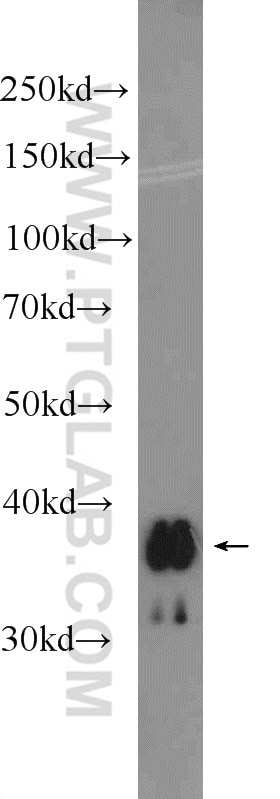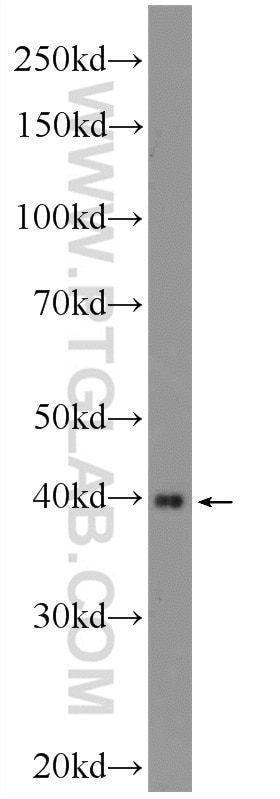Anticorps Polyclonal de lapin anti-UCP5
UCP5 Polyclonal Antibody for WB, ELISA
Hôte / Isotype
Lapin / IgG
Réactivité testée
Humain
Applications
WB, ELISA
Conjugaison
Non conjugué
N° de cat : 25223-1-AP
Synonymes
Galerie de données de validation
Applications testées
| Résultats positifs en WB | tissu cérébral humain fœtal, cellules PC-3 |
Dilution recommandée
| Application | Dilution |
|---|---|
| Western Blot (WB) | WB : 1:200-1:1000 |
| It is recommended that this reagent should be titrated in each testing system to obtain optimal results. | |
| Sample-dependent, check data in validation data gallery | |
Informations sur le produit
25223-1-AP cible UCP5 dans les applications de WB, ELISA et montre une réactivité avec des échantillons Humain
| Réactivité | Humain |
| Hôte / Isotype | Lapin / IgG |
| Clonalité | Polyclonal |
| Type | Anticorps |
| Immunogène | UCP5 Protéine recombinante Ag18661 |
| Nom complet | solute carrier family 25 (mitochondrial carrier, brain), member 14 |
| Masse moléculaire calculée | 325 aa, 36 kDa |
| Poids moléculaire observé | 36-40 kDa |
| Numéro d’acquisition GenBank | BC119666 |
| Symbole du gène | UCP5 |
| Identification du gène (NCBI) | 9016 |
| Conjugaison | Non conjugué |
| Forme | Liquide |
| Méthode de purification | Purification par affinité contre l'antigène |
| Tampon de stockage | PBS avec azoture de sodium à 0,02 % et glycérol à 50 % pH 7,3 |
| Conditions de stockage | Stocker à -20°C. Stable pendant un an après l'expédition. L'aliquotage n'est pas nécessaire pour le stockage à -20oC Les 20ul contiennent 0,1% de BSA. |
Informations générales
UCP5, also known as BMCP1 (brain mitochondrial carrier protein-1), is a member of uncoupling proteins (UCPs) that catalyze proton leaks across the inner mitochondrial membrane, thus uncoupling fuel oxidation from ATP synthesis. UCPs are implicated in metabolic rate and adaptational thermoregulation. UCP5 is widely expressed with high abundance in brain and testis. Alternative splicing generates several isoforms of UCP5.
Protocole
| Product Specific Protocols | |
|---|---|
| WB protocol for UCP5 antibody 25223-1-AP | Download protocol |
| Standard Protocols | |
|---|---|
| Click here to view our Standard Protocols |



